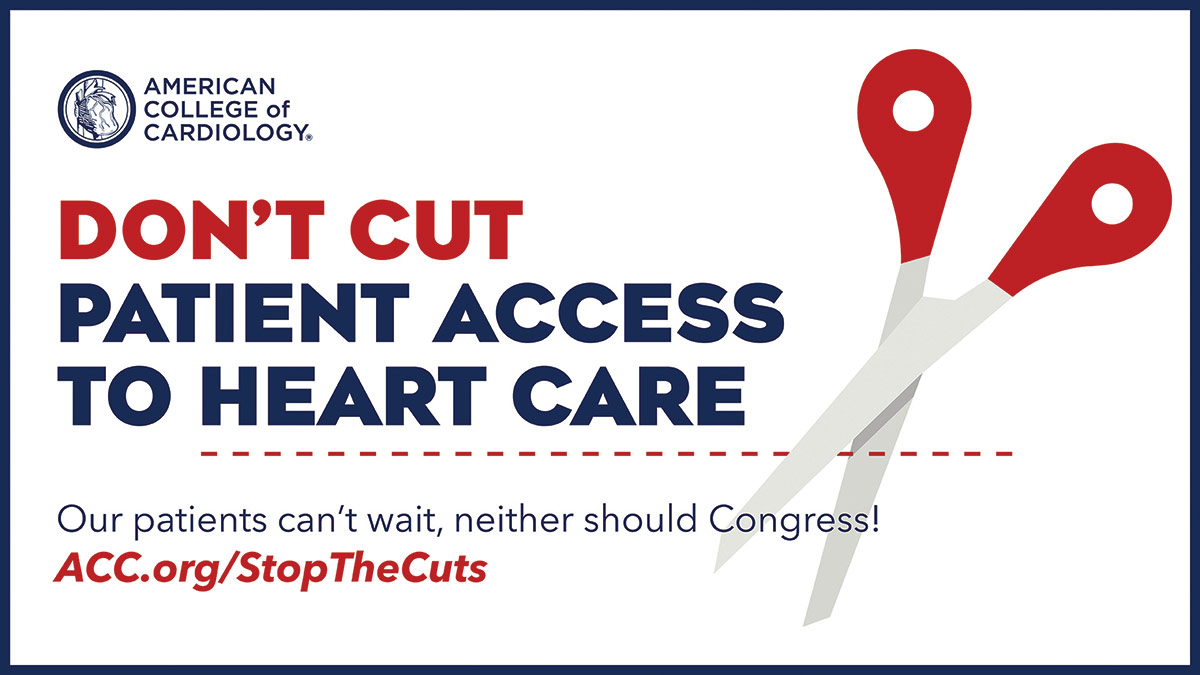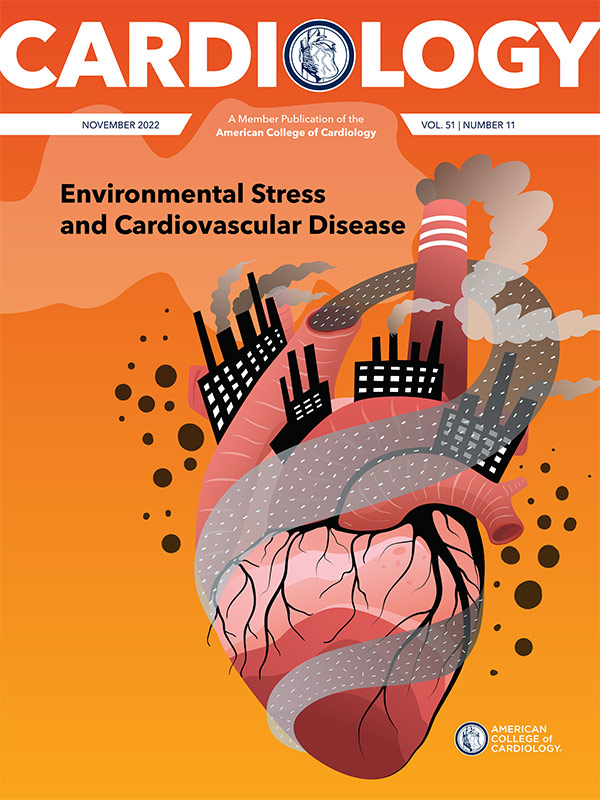Feature | Voices of Cardiology Heard on Capitol Hill

Hundreds of ACC members spanning the entire field of cardiology took part in ACC's 2022 Legislative Conference in Washington, DC, from Oct. 16 to 18. The three-day event provided an important opportunity for members to learn more about the biggest health policy issues before Congress, discuss current and future challenges and opportunities facing clinicians and patients, and gain insights into the ongoing work of ACC Advocacy, including HeartPAC.
More importantly, attendees were also able to meet directly with lawmakers and their staff to share firsthand perspectives on ways Congress can help develop public health initiatives, increase patient access to care, and improve clinician well-being. Cardiology offers a closer look at the health policy issues that took center stage during this year's conference.
Addressing Workplace Violence
The health care workforce should be able to focus on providing high quality patient care without the threat of violence or intimidation in the workplace. The safety and well-being of our members, colleagues and patients are paramount and at the core of our efforts to enhance professionalism, which is tied to guaranteeing the security and welfare of all clinicians and their patients. Improving heart health starts with clinicians and the communities they serve having a safe place to live, to work and to receive care.
Pass the Safety From Violence for Healthcare Employees (SAVE) Act (H.R. 7961), introduced by Reps. Madeleine Dean (D-PA) and Larry Bucshon, MD, (R-IN).
South Asian Heart Health Awareness and Research
It is important that Congress take thoughtful action to address this issue and decrease health inequities by expanding grants for culturally appropriate outreach efforts and research. In the 2019 Mediators of Atherosclerosis in South Asians Living in America (MASALA) study conducted by the ACC and the American Heart Association, researchers found a higher prevalence of type 2 diabetes in South Asians (23%), Blacks (18%), Latinos (17%) and Chinese Americans (13%) compared with Caucasians (6%). Reducing the burden of diabetes, risk of heart disease, decreased quality of life and untimely death within these communities is a task of great importance.
Pass the South Asian Heart Health Awareness & Research Act of 2022 (SAHHARA) (H.R. 3771) introduced by Reps. Pramila Jayapal (D-WA) and Joe Wilson (R-SC), which passed in the U.S. House and was referred to the Senate Committee on Health, Education, Labor, and Pensions in July 2022.
Valvular Heart Disease Research
Each year, roughly 935,000 Americans will have a heart attack, and more than 30% will experience a secondary life-threatening cardiovascular event. Currently, there is no heart valve disease screening recommendation from the U.S. Preventive Services Task Force nor is screening part of the "Welcome to Medicare" preventive visit or the yearly "Wellness" visit. It is important for the public and clinicians to be aware of patients' risk for valve disease, to recognize symptoms, and to provide or receive accurate and timely diagnosis. According to an awareness survey, three out of four Americans report knowing little to nothing about heart valve disease and many are never diagnosed or are diagnosed late in the course of the disease. Additionally, the COVID-19 public health emergency has caused many to delay health care and medical treatment.
Co-sponsor and support the Cardiovascular Advances in Research and Opportunities Legacy (CAROL) Act (S. 1133) introduced by Sens. Mitch McConnell (R-KY) and Kyrsten Sinema (D-AZ).
Expanding Patient Access to Cardiovascular Care
The College has long supported expanding access to cardiovascular and pulmonary rehabilitation services. For patients with cardiovascular disease, these programs are proven to reduce the risk of a future cardiac event, reduce all-cause mortality by 25%, decrease hospitalizations and the use of medical resources, and improve health-related quality of life.
Pass the Increasing Access to Quality Cardiac Rehabilitation Act of 2021 (S. 1986/H.R. 1956), introduced by Sens. Shelley Moore Capito (R-WV) and Amy Klobuchar (D-MN) and Reps. Lisa Blunt Rochester (D-DE) and Adrian Smith (R-NE), which would expand the ability of the cardiac care team (PAs, NPs, CNSs) to order and supervise cardiac and pulmonary rehabilitation services beginning in 2023.
Streamlining Prior Authorization Practices
The ACC supports the following list of goals developed by an AMA-led coalition for refined prior authorization principles centered around transparency, standardization and efficiency:
- Define "selective application of prior authorization" to mean review and authorization for coverage of a test or treatment where appropriate for requests not covered by published clinical guidance.
- Prohibit procedure and medication substituting by payers consistent with Appropriate Use Criteria and guidelines.
- Allow for "prior authorization program review and volume adjustment," so payers and contracted benefit managers can authorize requests for tests and treatments from providers or practices that demonstrate compliance with established published clinical guidance.
- Require payers to make rates of allowed and denied procedures available to consumers.
- Avoid interruption in care by allowing patients granted coverage for a given treatment or medication under one payer to transfer that coverage to another payer.
- Establish online standardized prior authorization tools and criteria for providers and their practice staff.
Co-sponsor and support the bipartisan Improving Seniors' Timely Access to Care Act (S. 3018), introduced by Sens. Roger Marshall, MD, (R-KS), Krysten Sinema (D-AZ) and John Thune (R-SD). The House companion to this bill passed in September 2022.
Sending a Message to Congress
Stagnant physician payment for Medicare services already exacerbates financial uncertainty for health systems and practices, strains the well-being of the clinician workforce and threatens patient care. Continued or additional cuts only serve to further contribute to these risks.
Long-term, ACC is asking Congress to partner in developing reimbursement models that promote value, recognize the reality of budget constraints, reward high-quality and high-valued outcomes, and align incentives of payers, patients and clinicians. Near-term, the College is asking Congress to mitigate already-enacted cuts and detrimental looming cuts through passage of the Supporting Medicare Providers Act of 2022 (H.R. 8800), introduced by Reps. Ami Bera (D-CA) and Larry Bucshon (R-IN), that would provide temporary relief by adding an additional 4.42% to avoid cuts associated with budget neutrality.
As part of Legislative Conference-related activities, the ACC developed an ad campaign calling on Congress to act. The campaign included a print ad in Politico, a DC-based newspaper, that was timed for the same day that conference attendees took to Capitol Hill, as well as digital ads that were shared across ACC's social media channels and in the College's email newsletters.
In addition to urging congressional action, the ACC is engaged alongside partner cardiovascular societies like the Heart Rhythm Society in direct outreach to the Centers for Medicare and Medicaid Services urging the agency to reconsider the steep reductions proposed for electrophysiology codes.
The College is also involved with hearings and roundtables with the broader medical community to advocate for systemic reform.
Click here to learn more about ACC's efforts to "Stop the Cuts."
Clinical Topics: Valvular Heart Disease
Keywords: ACC Publications, Cardiology Magazine, ACC Advocacy, Legislative Conference, Heart Valve Diseases
< Back to Listings



